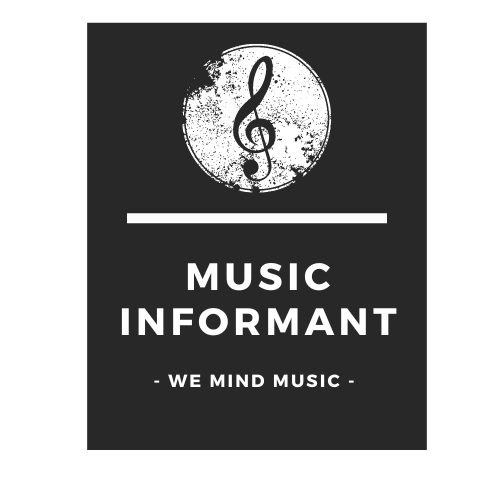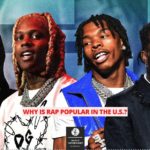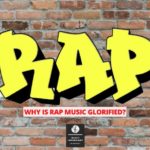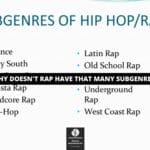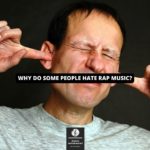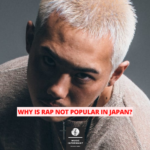
Why Are Rap Lyrics Admissable in Court?: Being a rap artist can be a dangerous profession. Everything you say — in interviews, on social media, in songs — is out there for the world to interpret and misconstrue as they see fit. The law is no different from the internet regarding the creative interpretation, with judges regularly drawing conclusions based on the content of rap lyrics. That alone should make your skin crawl if you’re an aspiring MC. Still, things get even more complicated when you consider the implications of rap lyrics being used as evidence against defendants in court. Is this legal? Are songs ever admissible?
Answering these questions is challenging (no one wants music censorship) because it depends on the case’s specifics. In the last two decades, there have been numerous cases where rap lyrics have been used as evidence to convict criminals.
So. Why Are Rap Lyrics Admissable in Court?

We’re not going to lie: it’s a strange idea. Like most people, rap lyrics should be admissible in court only if someone admits to writing them. But the reality is that if prosecutors can prove that the songs are relevant, they can be accepted as evidence—even if they were written by someone else entirely.
It’s true! And we’ll tell you why, but first, we need to explain a few things about rap music and its place in American culture.
Rap music has become increasingly popular over the past few decades, not just among black Americans but also whites and Hispanics. The genre has even taken hold in other countries worldwide, including Canada and Australia (look up “Canadian hip hop” on YouTube). It’s a big part of our culture that people often use specific phrases from rap songs as jokes when they’re having fun with their friends or family members—even those who don’t listen to rap!
10 Reasons Why Rap Lyrics Are Admissable in Court?

1. the First Amendment protects Rap Lyrics.
2. Rap Lyrics Are Not Always Admissible as Evidence.
3. The Courts Must Consider the Context of the Lyrics.
4. The Courts Must Consider the Context of the Case.
5. The Courts Must Consider the Context of the Defendant’s Life.
6. The Courts Must Consider How Closely They Relate to Each Other and the Case at Hand.
7. The Courts Must Consider Whether They Are More Probative than Prejudice When Considering Admissibility.
8. The Courts Must Consider How Specific and Well-Known They Are Before Being Admissible as Evidence
9. The Courts must consider whether they are relevant to a Material Fact in Dispute.
10. Lyrics May Have an Insufficient Reputation for Accuracy.
Lyrics Protected by the First Amendment:
In the United States, rap lyrics are protected by the First Amendment.
The Supreme Court has ruled that rap lyrics are protected by the First Amendment, meaning they can be used in court as evidence. Rap and hip-hop are considered forms of artistic expression. The Supreme Court ruled that using rap as evidence was not a violation of any law because it is also a form of speech.
However, there are a few exceptions to this rule:
1) When defendants claim ownership over their lyrics, they cannot be used as evidence against them because it would be considered identity theft.
2) If an artist isn’t happy with how their lyrics are being used in court, they can ask them to be excluded from being used as evidence against them.
Rap Lyrics Are Not Always Admissible as Evidence:
At one time, rap lyrics were not admissible as evidence in court. The reasoning was that they were just words on a page and could not be used as evidence of any crime committed by the person who wrote them. However, thanks to recent changes in the law, it is now possible for prosecutors to use rap lyrics as evidence against defendants. This has led to some fascinating cases where prosecutors have cited rap lyrics as proof of guilt or innocence.
One such case involved a man named Micah Johnson, who was accused of killing five police officers in Dallas in 2016. The case against Johnson rested on two things: first, his Facebook posts about wanting revenge for police brutality, and second, his rap songs which talked about shooting cops and killing white people. In this case, both pieces of evidence were allowed into court—the first because Facebook posted it publicly online and the second because it was written down (i.e., recorded).
Rappers have always been known for speaking their minds when angry or upset about something—but now those words can be used against them in court!
The Courts Must Consider the Context of the Lyrics:
The first thing to know about rap lyrics is that they are admissible in court—even though they aren’t considered a “fact” or “proof.” This may seem like a strange distinction, but it’s necessary to understand why rap lyrics can be used as evidence.
The reason why courts consider lyrics as admissible evidence is because they’re supposed to be statements made by a defendant. Even if they’re not direct quotes from the defendant, they can still be used against them.
However, there are restrictions on how prosecutors can use rap lyrics as evidence. For example, prosecutors can’t use lyrics that aren’t relevant to the case or directly related to the crime charged against them (such as murder). The only time prosecutors can use these types of lyrics is when there’s strong evidence that these lyrics are relevant to their defence case—for example: if there’s been no other evidence presented yet, but this one person claims he was acting in self-defence then his rap lyrics could be used as proof for his defence case because it backs up his claim about what happened).
The Courts Must Consider the Context of the Case:
Rap lyrics are admissible in court, but only some of the time. The courts must consider the context of the case.
Keep your lyrics to yourself if you’re thinking about rapping in court.
Unless you want to get in trouble for perjury, that is.
The legal system has historically been very wary of rap lyrics as evidence because there’s much room for interpretation and manipulation—ask anyone who’s ever been accused of being “a bad motherfucker” or “keeping it real.” But recently, courts have begun recognising that lyrics can be used as evidence in certain circumstances.
When can rap lyrics be admissible in court? Well, if you’ve written them down somewhere else—like on social media or in a diary—you might be able to use them as evidence if they describe an event that happened during the crime (for example: if someone was rapping about committing murder).
Suppose they don’t specifically mention any events surrounding the crime. In that case, they probably won’t be admissible as evidence unless they contain other information that helps prove your case (for example: if someone was found guilty of robbing a bank but later claimed he was only pretending because he wanted attention).
The Courts Must Consider the Context of the Defendant’s Life:
As the popularity and influence of rap music have grown, so has the importance of its lyrics in court. Rap lyrics are becoming a common factor in criminal trials all over the country.
According to an article published by CNN, “Jurors increasingly are being asked to weigh rap lyrics as evidence in court cases, but experts say the verdicts may be too subjective to be used as anything more than a piece of evidence in some cases.”
So why are rap lyrics admissible in court? How can juries use them to make decisions about guilt or innocence?
The answer lies in context. The courts must consider the context of the defendant’s life when determining whether or not specific language is appropriate for inclusion into evidence.
Context is critical when determining whether or not a rapper is using violent language that could be interpreted as threats or intimidating behaviour towards another person.
If a rapper has been accused of murder, his lyrics describing violence towards other people may come under scrutiny during trial proceedings.
The Courts Must Consider How Closely They Relate to Each Other and the Case at Hand:
When it comes to the admissibility of rap lyrics in court, there are a few things that the court must consider. First, they must determine whether or not the songs are relevant to the case at hand. If they aren’t, then they can be excluded from the evidence. If appropriate, the court must decide how closely they relate to each other and the case at hand.
For somethinging like rap lyrics to be admitted as evidence in court, they must meet specific criteria:
1) They must be relevant to a case.
2) They cannot be hearsay.
3) They cannot violate the defendant’s constitutional rights.
4) They cannot violate any rules that govern what kind of evidence is allowed in courtrooms.
The Courts Must Consider Whether They Are More Probative than Prejudice When Considering Admissibility:
The Supreme Court has held that rap lyrics are admissible in court, provided that the court considers whether they are more probative than prejudicial. This is a higher standard than considering whether the songs are relevant to the case.
For a piece of evidence to be admissible in court, it must meet three requirements: (1) It must be relevant; (2) it must be material; and (3) it must not be unfairly prejudicial. The prosecution must prove each element by a preponderance of the evidence.
The Courts Must Consider How Specific and Well-Known They Are Before Being Admissible as Evidence:
When it comes to rap lyrics, one of the first questions that come to mind is: “Why are rap lyrics admissible in court?” The answer is simple: because they are part of the larger whole—the music.
The Courts Must Consider How Specific and Well-Known They Are Before Being Admissible as Evidence:
To establish that a rap lyric is admissible as evidence, it must be specific enough to be tied to an individual. For example, if someone were to write a song about killing someone, this would be too vague to use as evidence unless there was other evidence linking the person who wrote the song with the person who committed the murder.
On top of this requirement, courts must also consider how well-known these lyrics are within the community. For something like this to be used as evidence against someone, everyone involved in court proceedings must understand what was said in the lyrics being used against them so that they can adequately assess their impact on jurors’ decisions about guilt or innocence.
The Courts Must Consider Whether or Not They Are Relevant to a Material Fact in Dispute:
When it comes to court cases, many things are admissible. This can include everything from photos, videos and recordings to emails, text messages and even social media posts. But why are rap lyrics admissible in court? The truth is, they’re not always admissible—it depends on the case at hand.
Rap lyrics are generally only admissible if they are relevant to a material fact in dispute. For example, if two people were fighting over who was responsible for writing a song or if one person was accusing another of stealing their lyrics and using them without permission, then a judge would likely consider whether or not those lyrics were relevant to determining who should be held liable for damages.
On the other hand, if a child was accused of committing several crimes and his defence attorney wanted to use his rap lyrics as evidence of his character (e.g., “he’s not capable of doing these things”), then the prosecution would likely argue that those lyrics were irrelevant because they didn’t prove anything about what he did or didn’t do.
Lyrics May Have an Insufficient Reputation for Accuracy:
Do you know why rap lyrics are admissible in court? It’s because songs may have a poor reputation for accuracy.
In other words, the lyrics are not considered credible enough to be used as evidence in a case. Many factors go into whether or not rap lyrics can be used as evidence in a case, including whether or not the rapper is known for writing accurate lyrics and whether or not he has made any previous statements about the subject of the song. If a rapper has said something negative about a person before, this could also affect whether or not they’re allowed to use his lyrics in court.
For example, let’s say that Bob Dylan wrote a song called “I Shot My Wife”, in which he claims to have shot his wife. This would be hearsay because it is just an accusation made by someone else (Bob Dylan), so it cannot be used as evidence in court unless he could somehow testify under oath about it himself (which is unlikely).
Conclusion: Why Are Rap Lyrics Admissable in Court?
The short answer is: because the law is stupid.
But in all seriousness, rap lyrics are admissible in court because the courts decided it would be too difficult to determine whether or not the defendant wrote the songs.
The case that started was N.W.A.’s “Fuck tha Police,” which was admitted into evidence during a trial for assault and battery on an officer. The police asked for it, and the judge agreed to let them use it as evidence because they couldn’t prove whether or not Ice Cube had written the lyrics himself (even though they were attributed to him).
It wasn’t until after this case that rappers started getting worried about their lyrics being used against them in court—which is why there’s now a whole genre of songs dedicated to rapping about how you’re not going down without a fight if someone tries to take you down over your words.
This article is written by @MusicInformant // All Rights Reserved.
